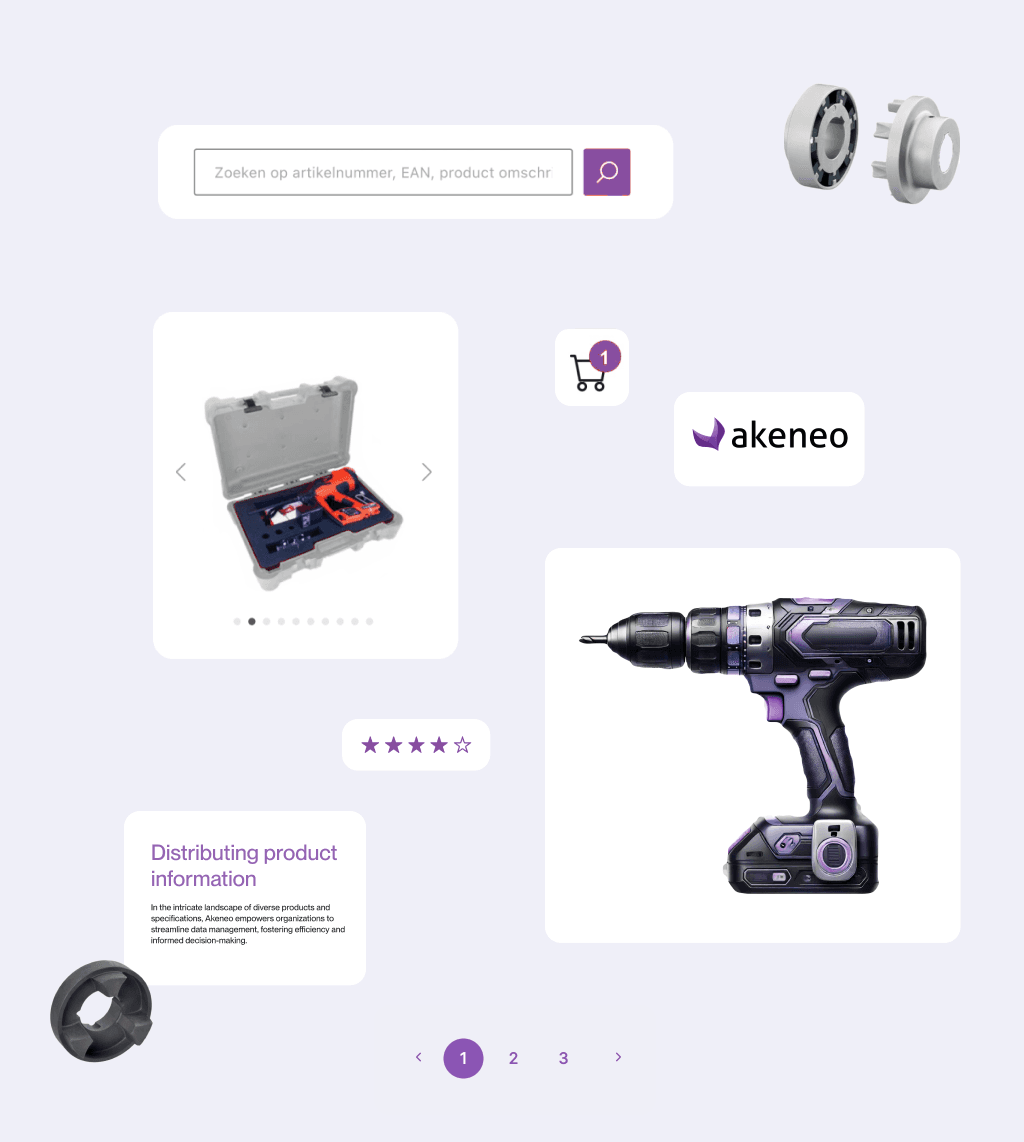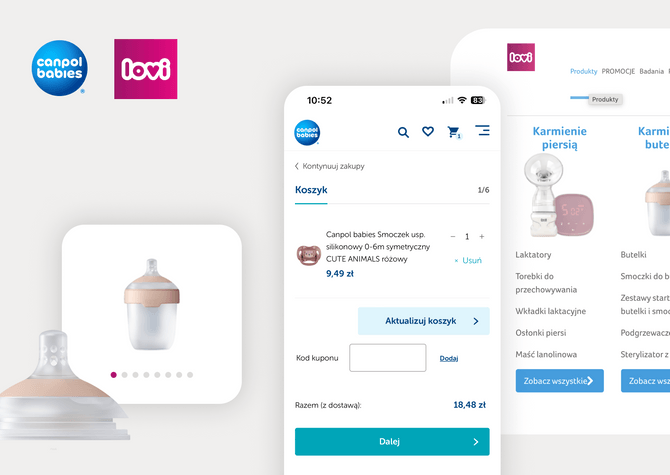Common pain points
Is handling product information a constant challenge in your company?
Without PIM software, it can seem like your organization is always in a battle with data chaos. If you're considering whether to adopt a product information management system like Akeneo, think about these crucial difficulties you’re probably facing.

Dispersed product data
Lacking a PIM system means you're probably handling product information across various spreadsheets or separate systems. This disorganized approach can lead to errors and inconsistencies in the information shown to buyers, causing confusion and reducing their trust. What does it say about your eCommerce if 40% of buyers return a product due to incoherent product information?

Slow product launches
Without a centralized system, your time-to-market is delayed. Managing product information manually means slower updates and launches, potentially costing you valuable opportunities.

Wasted resources
Carrying out repetitive tasks and manually entering data into each system that stores product-related data not only slows down processes but also wastes significant time and money that could otherwise be invested in strategic activities.

Poor team dynamics
Collaboration suffers when teams can’t access real-time, accurate product data. This problem gets worse when engaging numerous stakeholders, including external partners and vendors, which often leads to project delays and frustration.

Akeneo in one smooth ride
What is Akeneo used for?
Akeneo is a comprehensive Product Information Management (PIM) system that supports businesses in managing all aspects of their product data, including collection, cleansing, categorization, and enrichment.
Akeneo PIM is essentially the backbone for brands dealing with a broad range of products. Think of it as a central hub where every piece of product information – every color, size, and description – is organized and maintained.
By gathering all this data in one place, Akeneo allows companies to eliminate repetitive processes and errors, simplify the process of updating information, and reduce the time it takes to launch new products.
Businesses can rely on this PIM tool to ensure consistency and accuracy in their product data, which is spread across e-commerce platforms, marketplaces, paper catalogs, and other sales-related areas.
With Akeneo, you gain data governance you can rely on: clear ownership, controlled workflows, and validation rules that keep product information trustworthy across all channels.
The impact on businesses
Why Akeneo PIM?
Akeneo PIM is a complete, easy-to-use, and cost-effective PIM system that can be implemented to quickly fill the product information management gap in your organization.

Better quality and streamlined data control
With Akeneo PIM, say goodbye to inconsistencies. The centralized nature of PIM systems allows you to eliminate data silos across departments and platforms. Through its structured data entry and validation mechanisms, Akeneo delivers superior data quality, limiting mistakes and reducing the necessity for later adjustments.

Routine task automation
Leverage Akeneo to automate everyday tasks like assigning and updating various product attributes, their categorization, and data accuracy checks. With the introduction of PIM, what once took teams around 10 minutes now takes just 30 seconds to complete a product upload.

Built to support expansion
PIM Akeneo is ready to grow with your business, whether you’re introducing ten or ten thousand new products. Its adaptable and scalable infrastructure allows you to grow your product listings and access new markets without declines in system performance.

Market-specific product information
With Akeneo, you can customize your product information for various global markets, aiming to improve how different groups of customers perceive and interact with your products.

Flexible system integration
Akeneo can be easily incorporated into your existing tech ecosystem. It provides ready-to-use integrations, and if something is missing, the API can help you integrate it. Akeneo supports popular e-commerce platforms (like Shopware and Magento), along with DAM, ERP, and CRM software, broadening your system’s capabilities.

Insightful analytics for smart decisions
Akeneo is more than just a repository for your product data. Its features allow teams to quickly identify trends, pinpoint discrepancies, and make informed decisions about your catalog management and marketing strategies, without sifting through spreadsheets or multiple disconnected systems.
20 %
of online shoppers were unable to complete online purchases due to poor or missing product details, according to Nielsen's research.
80 %
of companies are skeptical about the accuracy of their product data. If companies can't trust their own data, how can customers trust their products?
23 %
fewer product returns are seen by companies investing in product information systems.

PIM comparison
Akeneo vs Pimcore: Which PIM system suits your needs better?
If you require a solid, trusted tool for standard product data management tasks including organizing, classifying, enriching, quality assurance, and distribution, select Akeneo.
If you’re in search of a versatile and highly customizable tool, Pimcore is worth a look. It offers numerous modules in addition to PIM that can be adjusted to fit your business's unique requirements. However, be aware that implementing Pimcore may take more time and money at the start due to its complexity and the broad range of functions.
If your business is looking for a solution that is quick to implement and doesn't require a large initial investment, the free version of Akeneo could be a good fit. However, note that the Akeneo Community Edition has many limitations. To fully benefit from this system, licenses are necessary, which involve additional costs.
If you prioritize control over your infrastructure and data security, consider using Pimcore. You can install it on your own server (on-premise), ensuring you have full oversight of both your infrastructure and data protection.
If a cloud-based PIM system is more convenient for you, Akeneo is the way to go. Your software and data will be hosted on external servers and managed by the service provider. This setup offers benefits like lower infrastructure costs and better scalability.
Discover the side-by-side evaluation here.
Frequently asked questions about Akeneo PIM
Is Akeneo open source?
Yes, Akeneo PIM began its journey as an open-source platform and it continues to offer an open-source edition known as Akeneo Community Edition (CE). This edition provides businesses with a robust tool for managing their product information without the associated costs of licensed software. You can also use this PIM platform for a monthly fee:
Growth Edition (GE): A paid, cloud-based solution with enhanced SLA support.
Enterprise Edition (EE): An option that offers all features of the Growth Edition with additional customization and process management capabilities.
Does Akeneo have a DAM?
Akeneo doesn't come with a built-in DAM. While Akeneo primarily focuses on managing product information, it seamlessly integrates with various DAM systems. The integration possibilities are wide, allowing businesses to enrich their product listings with logos, audio files, or images and videos that are not strictly linked to products.
Akeneo enables you to keep all images and multimedia content associated with your product catalog. If you're interested in a solution that includes Digital Asset Management capabilities, you might want to look at Pimcore.
What is Akeneo built on?
Akeneo is crafted using a solid foundation of Symfony, a popular PHP framework. On the front-end, Akeneo uses modern web technologies like React to deliver a responsive and intuitive user interface.
What is the difference between Pimcore and Akeneo?
Akeneo and Pimcore both offer robust product information management systems, but they cater to slightly different needs. Akeneo focuses exclusively on PIM with a user-friendly interface that simplifies the management of product data across various sales channels. On the other hand, Pimcore is more than just a PIM; it's a comprehensive suite that includes digital asset management (DAM), customer data platform (CDP), and eCommerce capabilities. This makes Pimcore a versatile choice for companies that want an all-in-one solution to manage not only their product information but also digital assets, customer data, and e-commerce operations from a single platform.
What is a product model in Akeneo?
In the world of PIM Akeneo, a product model is a powerful and essential concept that streamlines the management of complex product structures. For instance, imagine you sell a t-shirt that comes in multiple sizes and colors. Instead of treating each variation as an entirely separate product, Akeneo enables you to create a product model where each variation can inherit common attributes from the model, such as material and brand, while differing in size and color.
Akeneo lends itself well to step-by-step guides, because the platform encourages structured processes (from importing product data, to enriching attributes, to publishing across channels with validation gates in between).
How can Akeneo support B2C eCommerce?
Combining eCommerce with PIM systems is crucial. For B2C sectors, Akeneo streamlines the management of diverse, fast-changing product inventories, making it easier to launch products and update them in response to consumer trends and seasonal changes. Akeneo also enhances shopping experiences by delivering rich product descriptions, high-quality images and videos, and uniformity in product presentation across various retail platforms (e.g. across e-commerce channels, marketplaces, and social media platforms). They are fundamental in capturing the interest of consumers.
Can Akeneo be beneficial for B2B eCommerce operations?
Akeneo helps B2B companies keep their product catalogs current and precise, which is essential for building solid relationships with distributors and retailers. It provides strong technical features that make managing large and complex product catalogs practical, not overwhelming – from structured data models to automation and scalable integrations.
One of the crucial implementation tips is to avoid customizations early on: work with Akeneo’s native features first, and only extend where it supports a real business need.
How does implementing Akeneo PIM benefit manufacturers?
In essence, Akeneo PIM optimizes how manufacturers operate, driving efficiency, reducing costs, and enhancing the overall product experience for customers. At its core, Akeneo provides a centralized platform where data from various sources is consolidated, cleaned, and organized. This allows teams to maintain a single source of truth for product data, which can then be uniformly distributed. The process begins with data integration from existing systems like ERP and CRM or from spreadsheets. This level of organization is crucial for manufacturers dealing with thousands of SKUs and complex product hierarchies. Akeneo then enables product enrichment, giving your team a clean workspace to add detailed descriptions, specifications, images, translations, and context.
Akeneo also helps you manage required certifications, safety information, and region-specific documentation in a structured, traceable way.
What integrations are common?
- ERP (SAP, MS Dynamics, IFS, Infor) – items, price, stock, dimensions
- E-commerce (Adobe Commerce/Magento, Shopify, BigCommerce, Shopware)
- DAM (Adobe Experience Manager Assets, Bynder, Cloudinary) – media and renditions
- MDM/PLM – upstream master data and engineering specs
- Search (Elasticsearch, Algolia) – facets/attributes
- CDP/CRM – product attributes for personalization and campaigns
- BI – data quality and enrichment productivity reporting
- Middleware/iPaaS (MuleSoft, Boomi, Celigo) – orchestration
When you still want more
Proven solutions for forward-thinking businesses
Our strategy is straightforward: apply technologies that have proven their worth in solving customers' problems.
What other systems could one consider? Here is an overview:
Trusted by global brands
Are you still managing product information the old way?
Suitable for any industry, including manufacturing and distribution, Akeneo helps in expanding your product catalog, enhancing team collaboration, optimizing omnichannel sales, and improving data quality and enrichment times. Join brands such as Forever 21, Fossil, Staples, and Myer who have improved their operations with Akeneo PIM. Get your products the attention they deserve: ask us how!















